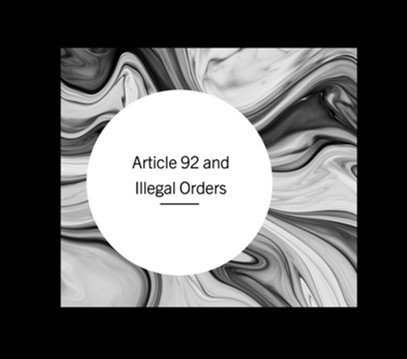Article 92: Can Service Members Refuse an Illegal Order?
Lessons from the LA Guard Ruling for Article 92
A recent federal court decision has put the issue of “illegal orders” back in the spotlight. On September 2, 2025, Judge Charles R. Breyer ruled that former President Trump’s deployment of thousands of National Guard troops and active-duty Marines to Los Angeles violated the Posse Comitatus Act, a federal law that restricts the use of military forces in domestic law enforcement. The ruling raises an important question for service members: What happens if you receive an order that turns out to be illegal? Are there defenses to violating Article 92?
Article 92 and Obeying Orders
Under the Uniform Code of Military Justice (UCMJ), Article 92, service members must obey lawful orders. Failure to obey a lawful order can lead to serious punishment, including court-martial.
But there is a key qualifier: the order must be lawful. If an order is manifestly illegal, service members not only may refuse it — they have a duty to do so. Obeying an illegal order can expose a service member to criminal liability.
When Is an Order “Manifestly Illegal”?
Not every questionable order counts. Courts have held that for an order to be manifestly illegal, its unlawfulness must be clear and obvious. Classic examples include:
- Orders to target civilians.
- Orders to falsify official documents.
- Orders to commit crimes such as theft or assault.
Most operational or deployment orders, even if later challenged in court, are not “obviously” illegal in the moment.
The LA Deployment Example
In Los Angeles, Guard commanders and troops were ordered to support law enforcement in ways the court has now deemed unlawful. But at the time, the order came from the Commander-in-Chief through the chain of command. For a National Guard officer on the ground, refusing to comply would have been extremely risky.
Without a clear legal directive from the Department of Defense or a court injunction in place, a commander who refused could have faced charges under:
- Article 92 (Failure to obey an order)
- Article 90 (Disobeying a superior officer)
- Article 94 (Mutiny or sedition)
The court’s ruling strengthens the argument that such deployments are unlawful, but service members still need definitive guidance from higher authority before refusing.
Bottom Line for Service Members
- You must obey lawful orders.
- You must refuse manifestly illegal orders.
- If you’re unsure, seek legal advice from a Judge Advocate before taking unilateral action.
The LA ruling underscores the complexity of military law: sometimes what seems like a straightforward command can later be judged unlawful. Service members caught in the middle must balance duty, risk, and the rule of law.
👉 If you are facing an investigation, adverse action, or possible court-martial for refusing or carrying out an order, you should speak with an experienced military defense attorney immediately. Attorney Peter Kageleiry, Jr. represents service members world wide. Contact us at +1-757-504-2815 or here.








